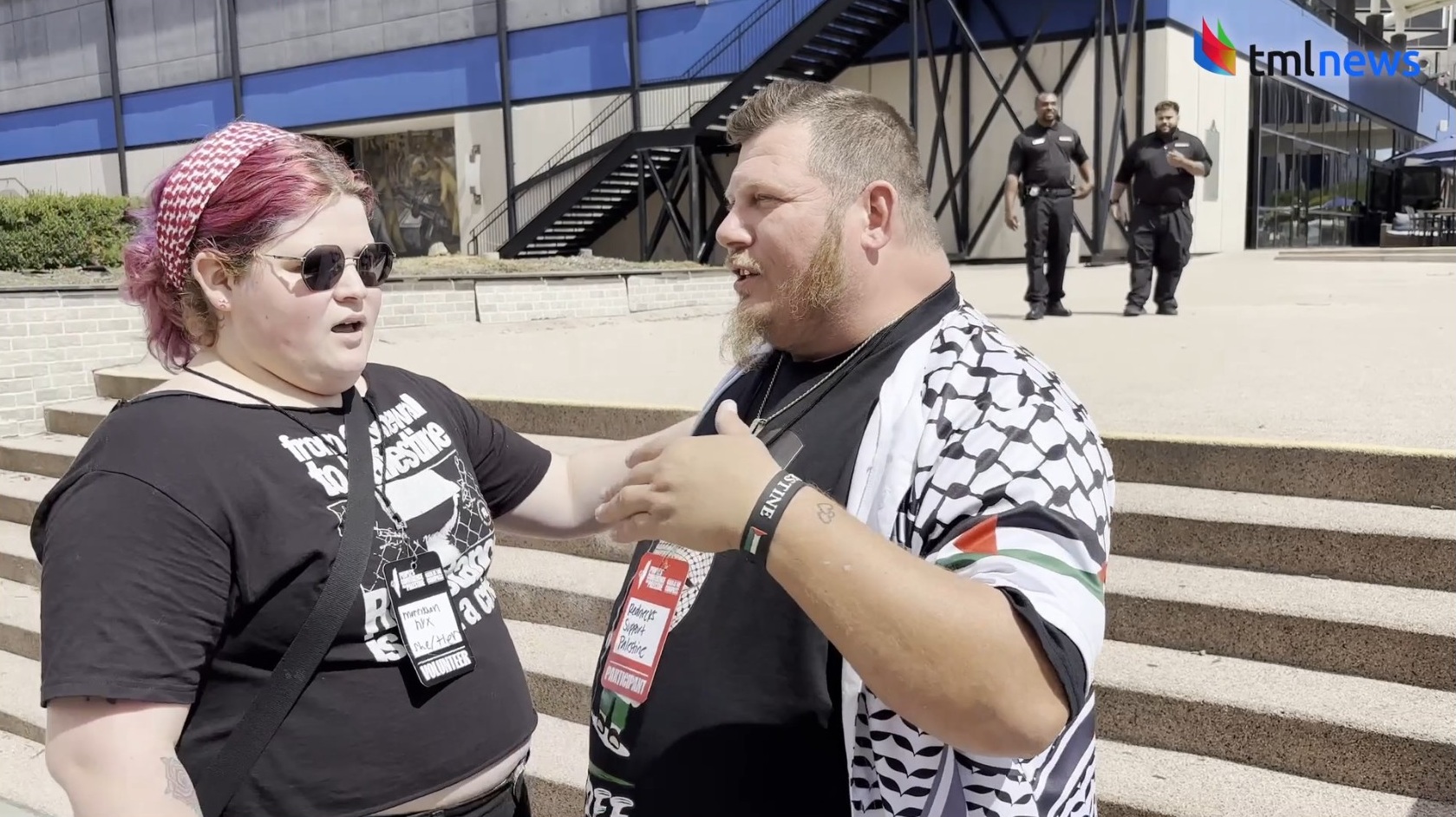Reporter’s Notebook: Outside Detroit’s Palestine Conference, Extremism and Denial Surface
A pro-Palestinian gathering in Detroit drew thousands, but the rhetoric from speakers and some attendees linked the event to groups accused of extremism
[Detroit] The sidewalks outside Huntington Place in downtown Detroit were alive with motion all weekend. Caravans of buses had been promised, but many never materialized; I met attendees who shrugged and told me they’d cobbled together their own travel after “organized” groups fizzled out. Still, by the organizers’ count, some 4,000 people made their way to the second annual “People’s Conference for Palestine: Gaza is the Compass.” Families with children in tow, students with keffiyehs draped over their shoulders, and activists with clipboards streamed through the doors.
Inside, according to the program, the event offered workshops on how to “isolate Israel, Zionists and Zionism” and strategies to prevent Israel from repairing its international image. Other sessions were explicitly framed around fighting “colonialism and imperialism.” Organizers promised cultural exhibitions, daycare, and even activities for children as young as 4, all wrapped in rhetoric about “strategizing” for the next phase of struggle.
October 7 was a setup
When I asked attendees why they came, many first answered “fun and networking with like-minded activists.” Others quickly disengaged once my questions didn’t use their preferred terminology. Some broke off mid-conversation. One attendee corrected me sharply when I used the word “conflict,” saying, “Conflict is not how I would call it.”
Give the gift of hope
We practice what we preach:
accurate, fearless journalism. But we can't do it alone.
- On the ground in Gaza, Syria, Israel, Egypt, Pakistan, and more
- Our program trained more than 100 journalists
- Calling out fake news and reporting real facts
- On the ground in Gaza, Syria, Israel, Egypt, Pakistan, and more
- Our program trained more than 100 journalists
- Calling out fake news and reporting real facts
Join us.
Support The Media Line. Save democracy.


A handful went further, praising Hamas, denying the Oct. 7 massacre, or spinning conspiracies about Jews and Zionists. Abdullah Mohammed, a Muslim social media influencer better known as Rednecks Support Palestine, filmed himself laughing as he dismissed Israeli accounts of the attack. In interviews, Mohammed went further, declaring, “October 7 was a setup,” and later, “Well, Hamas is not a terrorist organization. They are a resistance group. To me, they are a resistance group.” When pressed about Hamas’ charter calling for Israel’s eradication, he replied, “Israel needs to be eradicated.” He went on to claim Jews had “never had land” and described them as “always drifters.” He rejected video evidence of Hamas atrocities outright: “I would never be open to seeing any of their footage, because I don’t believe their footage.”
Other attendees echoed similar lines. One insisted that Israeli accounts of dead infants were fabrications: “All the dead Israeli babies that we have no proof of, right, this is the narrative.” Another dismissed Hamas’ responsibility for civilian deaths.
Full disclosure: I never made it inside. Organizers required journalists to register 48 hours in advance and to submit “coverage plans.” At the desk, I was told bluntly that entry was impossible without prior approval. That left me on the pavement, speaking with anyone willing to stop. In some cases, conference volunteers even crossed the street to interrupt conversations, urging attendees not to talk to me or to the tiny counterprotest nearby.
Across the street, the pro-Israel presence consisted of just two people with a banner. Ruth Tamara Poberesky, who helped organize the modest demonstration, told me she believed conference-goers were being “brainwashed” and “bought and financially supported by Qatar and other countries.” She added, “There already is a Palestinian country called Jordan.” Asked about accusations that she herself was brainwashed, Poberesky replied: “Of course they say that, but you know, like I said, it’s lack of education. They need to learn history.”
There already is a Palestinian country called Jordan
The speaker list told its own story. Hussam Shaheen, once a member of the Al-Aqsa Martyrs’ Brigade, appeared by video because the US denied him a visa; he had been sentenced in 2004 to 27 years in prison for attempted murder before his release earlier this year in a hostage exchange. Another was Raja Abdulhaq, co-founder of Quds News Network, banned from X in 2019 for Hamas ties. Then there was Omar Assaf, a 75-year-old veteran of the Democratic Front for the Liberation of Palestine, who still praises “armed struggle.” He too was denied entry into the US and spoke from abroad.
An organization that supports terrorists, breaks US law and promotes antisemitism shouldn’t benefit from the US tax code
This was hardly new. Last year’s conference hosted Sana’a Daqqa, widow of Walid Daqqa, a Popular Front for the Liberation of Palestine fighter convicted in the brutal 1984 kidnapping and murder of IDF soldier Moshe Tamam. Sponsors this year again included Students for Justice in Palestine, Jewish Voice for Peace, and the Palestine Youth Movement—groups that critics say are linked to Hamas or Muslim Brotherhood networks. Senator Tom Cotton of Arkansas even called on the IRS to investigate the Palestine Youth Movement, writing: “An organization that supports terrorists, breaks US law and promotes antisemitism shouldn’t benefit from the US tax code.”
On the surface, the conference looked like a cultural fair: music, children’s programs, and old friends reuniting. But the guest lineup and sponsor list tied it to figures and organizations long accused of extremism. Standing outside, caught between the celebratory stream pouring in and the two-person protest across the street, the contradictions were impossible to miss: an event marketed as community empowerment, entangled with networks carrying far darker associations.

